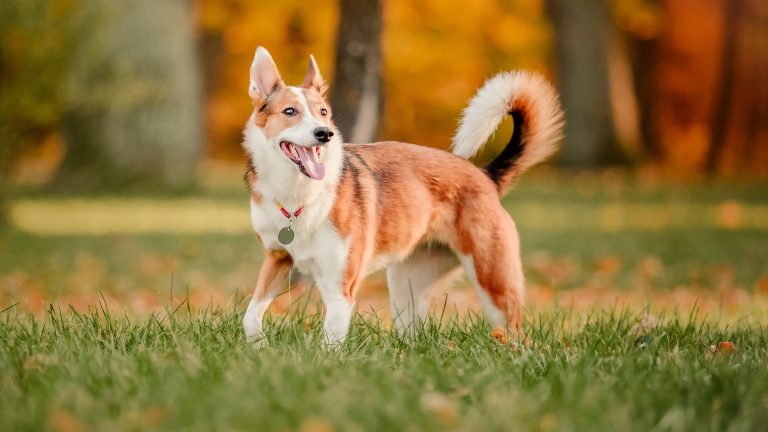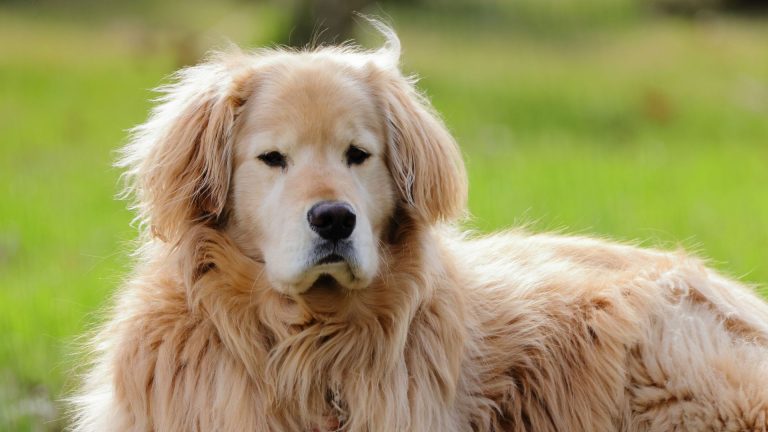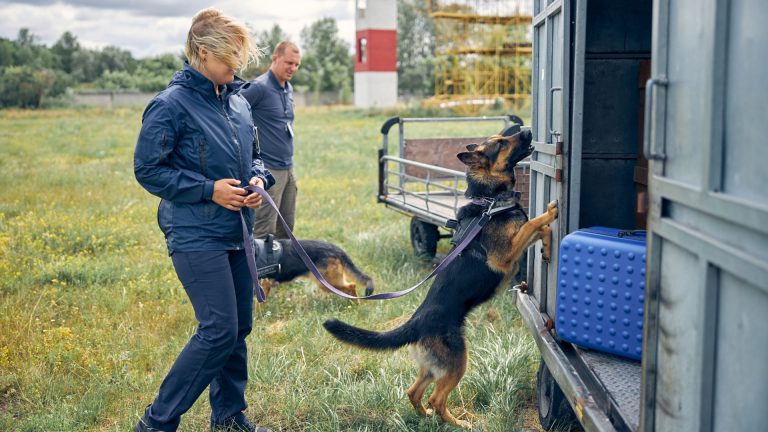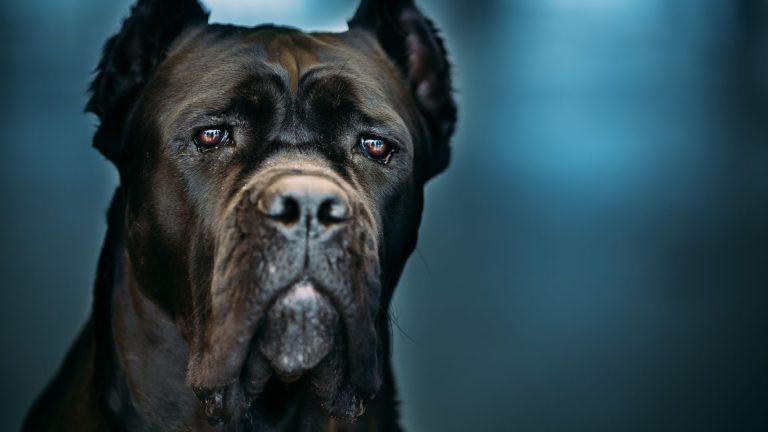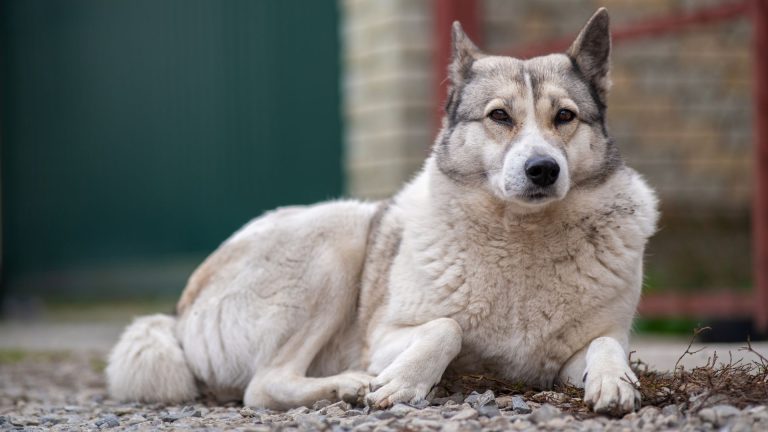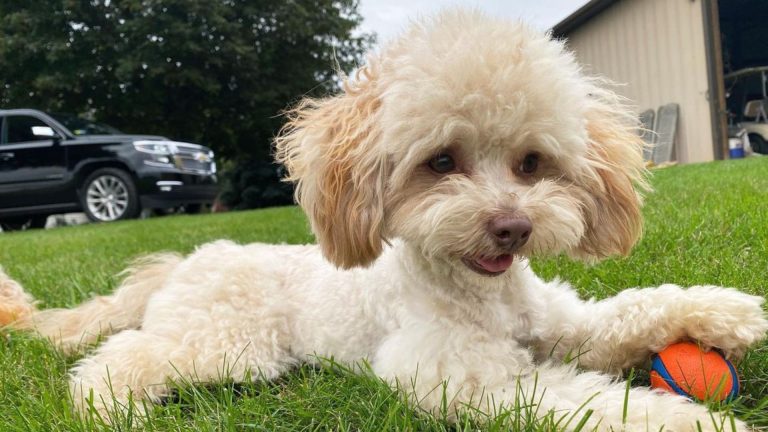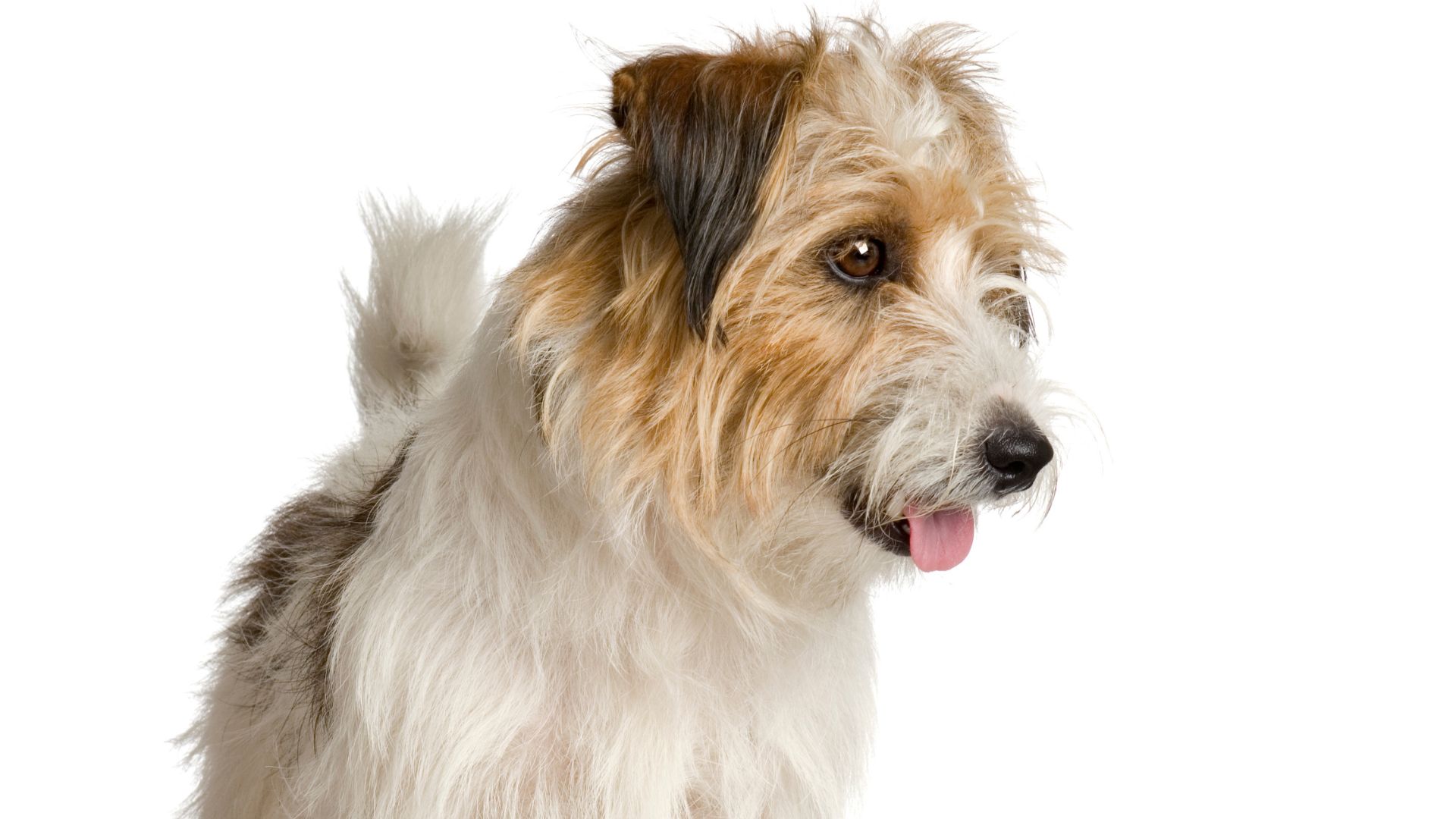
Contents
- 0.1 Why Choose a Dog Breed That Starts with J?
- 0.2 Detailed Profiles of Dog Breeds That Start with J:
- 0.3 Japanese Chin
- 0.4 Jack Russell Terrier
- 0.5 Jack Russell Terrier
- 0.6 Jack Russell Terrier
- 0.7 Japanese Spitz
- 0.8 Jindo
- 0.9 Jagdterrier (German Hunting Terrier)
- 0.10 Tips for Choosing the Right Breed for You
- 0.11 Adopting and Caring for Your New Dog
- 1 Conclusion
Choosing the right dog breed is crucial for a happy and harmonious life with your furry friend. Every breed has its own unique traits, needs, and behaviors. Selecting a breed that matches your lifestyle ensures a fulfilling relationship for both you and your dog.
In this article, we will focus on dog breeds that start with the letter J. These breeds are unique and offer a variety of characteristics that may suit different preferences and lifestyles. From energetic hunters to elegant companions, there’s a J breed for everyone.
You will learn about the history, physical characteristics, and temperaments of these breeds. We will provide detailed profiles of popular J breeds, such as the Japanese Chin, Jack Russell Terrier, Japanese Spitz, Jindo, and Jagdterrier. Additionally, we will offer tips on choosing the right breed for your needs and how to care for your new companion.
By the end of this article, you will have a comprehensive understanding of these J dog breeds. This will help you make an informed decision and find your perfect canine match. Enjoy discovering these wonderful breeds and what they can bring to your life.
Why Choose a Dog Breed That Starts with J?
Choosing a dog breed that starts with the letter J offers a unique and rewarding experience. These breeds often have distinct characteristics that set them apart from more common breeds. Owning a less common breed can also bring a sense of pride and individuality.
Uniqueness of J Dog Breeds
J dog breeds stand out for their variety and charm. For example, the Japanese Chin is known for its elegance and affectionate nature, while the Jack Russell Terrier is famous for its boundless energy and intelligence. Each breed offers something special, whether it’s the Jindo’s loyalty or the Japanese Spitz’s fluffy, cloud-like appearance.
Benefits of Choosing a Less Common Breed
Choosing a less common breed has several advantages. First, it often means fewer health issues due to less inbreeding. Less common breeds may also attract less attention, reducing the risk of theft. Additionally, owning a rare breed can be a great conversation starter, helping you connect with fellow dog enthusiasts.
Common Traits Among J Breeds
Despite their differences, J dog breeds share some common traits. Many of these breeds are highly intelligent and trainable, making them great companions for active individuals or families. They tend to be loyal and protective, providing a sense of security and companionship. Most J breeds are also adaptable, thriving in various environments from urban apartments to rural homes.
For instance, the Jack Russell Terrier is known for its agility and keen hunting instincts, while the Jindo is celebrated for its independence and strong bond with its owner. The Japanese Chin, with its playful and gentle nature, makes a wonderful lap dog. These breeds also vary in size and coat type, offering options for different preferences.
Choosing a dog breed that starts with J can enrich your life with a unique and devoted companion. These breeds bring a mix of intelligence, loyalty, and distinctiveness that can perfectly match your lifestyle and preferences.
Detailed Profiles of Dog Breeds That Start with J:
Japanese Chin
The Japanese Chin has a rich and noble history. Originating in China, this breed was gifted to Japanese royalty as a symbol of goodwill. Over centuries, the Japanese Chin became a cherished companion of Japanese nobility. Its regal presence and unique appearance have been admired for generations.
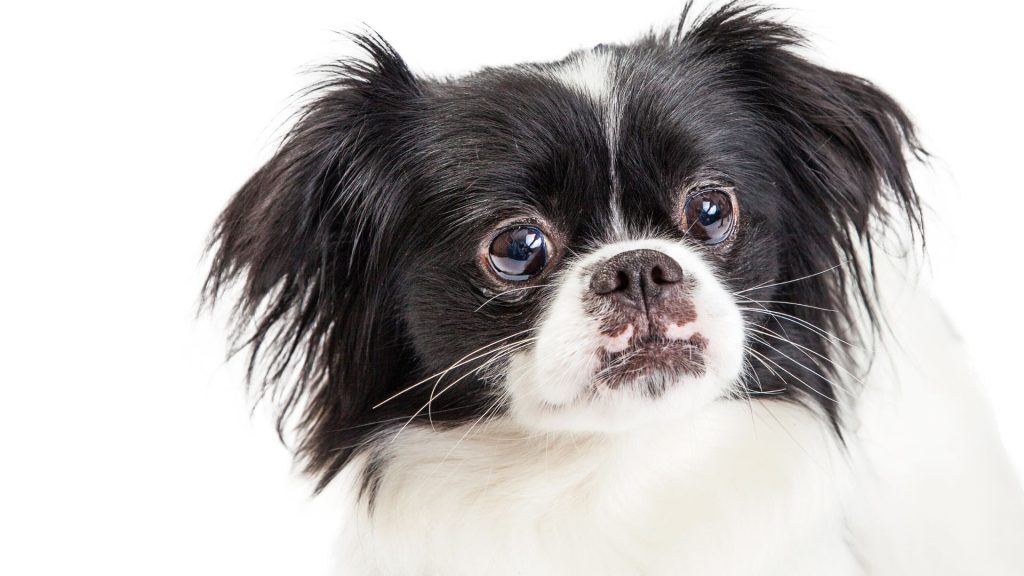
Physical Characteristics
The Japanese Chin is a small, elegant dog. It typically weighs between 4 to 9 pounds and stands about 8 to 11 inches tall. Its coat is long, silky, and straight, usually found in black and white, red and white, or tricolor. The breed’s large, dark eyes and distinctive pushed-in face give it an expressive and charming look.
Temperament and Behavior
This breed is known for its affectionate and playful nature. Japanese Chins are gentle, friendly, and highly intelligent. They enjoy being the center of attention and can be quite the entertainers. Despite their small size, they are confident and may act as if they are much larger. They are generally good with children and other pets, making them excellent family companions.
Care and Grooming Needs
The Japanese Chin’s long coat requires regular grooming to prevent tangles and mats. Brushing a few times a week is usually sufficient. Regular baths will keep their coat clean and shiny. Due to their short snouts, it’s important to clean their facial folds regularly to avoid infections. Their exercise needs are moderate; a daily walk and some playtime will keep them happy and healthy.
Health Considerations
Japanese Chins are generally healthy, but they can be prone to certain health issues. Due to their brachycephalic (short-nosed) nature, they may experience breathing difficulties, especially in hot weather. They are also susceptible to heart murmurs and patellar luxation. Regular vet check-ups and a healthy diet can help manage these potential issues.
In summary, the Japanese Chin is a delightful, elegant breed that makes a loving companion. With proper care and attention, this charming dog can bring joy and warmth to any household.
Jack Russell Terrier
The Jack Russell Terrier was developed in England in the early 19th century. Reverend John Russell, an avid hunter, sought to create a breed specifically for fox hunting. The result was a small, energetic terrier with a keen hunting instinct and a fearless attitude. Over time, the Jack Russell Terrier gained popularity not just as a working dog but also as a beloved companion.
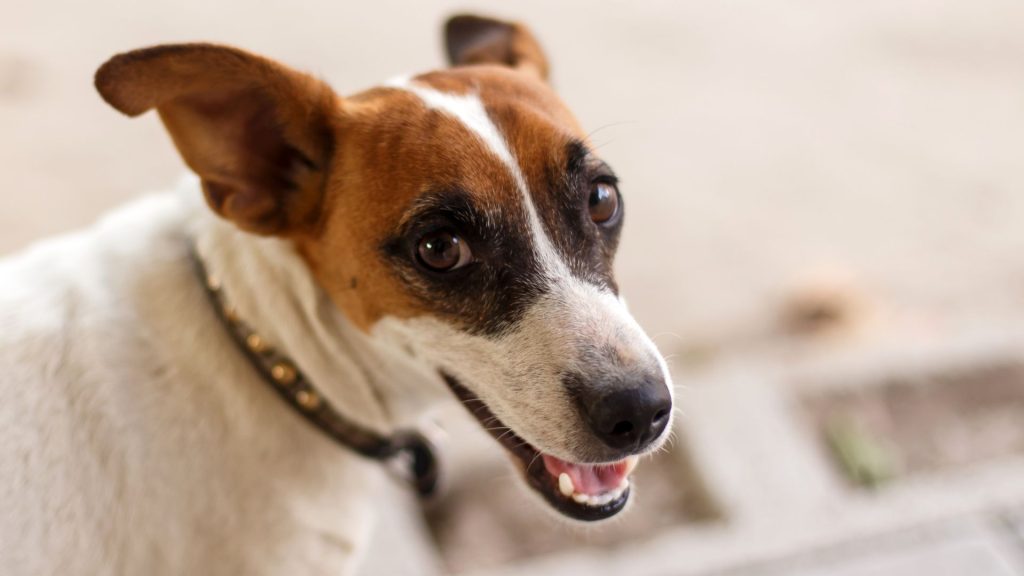
Physical Characteristics
Jack Russell Terriers are small but sturdy dogs. They typically weigh between 13 to 17 pounds and stand about 10 to 15 inches tall. Their coat can be smooth, rough, or broken, and is predominantly white with black, tan, or brown markings. They have a strong, athletic build with a compact body, making them agile and quick.
Temperament and Behavior
Jack Russell Terriers are known for their high energy levels and intelligence. They are bold, curious, and extremely lively. This breed thrives on activity and mental stimulation. They are also highly independent and can be stubborn, which makes consistent training essential. Jack Russells are affectionate with their families but may be wary of strangers. Their strong prey drive means they might chase smaller animals, so early socialization is crucial.
Care and Grooming Needs
The grooming needs of a Jack Russell Terrier are relatively low. Regular brushing will keep their coat healthy, regardless of the type. They are generally clean dogs and don’t require frequent baths. Given their high energy, they need plenty of exercise. Daily walks, playtime, and opportunities to run in a secure area are important to keep them happy and well-behaved. Mental stimulation, such as puzzle toys or training exercises, is also beneficial.
Health Considerations
Jack Russell Terriers are generally healthy, but they can be prone to certain conditions. Common health issues include patellar luxation, deafness, and eye disorders like lens luxation and glaucoma. Regular vet check-ups, a balanced diet, and an active lifestyle can help maintain their health. It’s also important to monitor their weight to prevent obesity, which can exacerbate health problems.
In summary, the Jack Russell Terrier is a spirited and intelligent breed that requires an active lifestyle and consistent training. With proper care, they can be a joyful and energetic addition to any household.
Jack Russell Terrier
The Jack Russell Terrier originated in England in the early 19th century. Reverend John Russell, an avid fox hunter, developed this breed to be a superior hunting dog. The goal was to create a small, agile, and determined terrier that could chase foxes out of their dens. Over time, the Jack Russell Terrier became popular not just for hunting but also as a lively companion.
Physical Characteristics
Jack Russell Terriers are small but sturdy dogs. They typically weigh between 13 to 17 pounds and stand about 10 to 15 inches tall. Their coat can be smooth, rough, or broken, and is predominantly white with black, tan, or brown markings. They have a compact, muscular build with a strong, athletic appearance. Their expressive, dark eyes and alert ears add to their lively and intelligent look.
Temperament and Behavior
Jack Russell Terriers are known for their high energy and intelligence. They are bold, curious, and full of life. These dogs are highly independent and can be quite stubborn, making consistent training essential. They are affectionate with their families but may be wary of strangers. Jack Russells have a strong prey drive and love to chase, so they need plenty of exercise and mental stimulation. They are excellent problem solvers and enjoy activities that challenge their minds and bodies.
Care and Grooming Needs
Grooming a Jack Russell Terrier is relatively easy. Regular brushing keeps their coat healthy and clean, regardless of the type. They are generally clean dogs and don’t need frequent baths. Given their high energy levels, they require plenty of exercise. Daily walks, playtime, and opportunities to run and explore are essential. Mental stimulation, such as puzzle toys and training exercises, is also important to prevent boredom and destructive behavior.
Health Considerations
Jack Russell Terriers are generally healthy but can be prone to certain health issues. Common problems include patellar luxation, deafness, and eye disorders like lens luxation and glaucoma. Regular vet check-ups, a balanced diet, and an active lifestyle can help maintain their health. It’s also important to monitor their weight to prevent obesity, which can exacerbate health problems.
In summary, the Jack Russell Terrier is a spirited and intelligent breed that thrives on activity and mental challenges. With proper care and attention, they can be a delightful and energetic addition to any family.
Jack Russell Terrier
The Jack Russell Terrier was developed in England in the early 19th century. Reverend John Russell, a passionate hunter, aimed to create a breed specifically for fox hunting. The result was a small, energetic terrier with a keen hunting instinct and fearless attitude. Over time, the Jack Russell Terrier gained popularity not just as a working dog but also as a beloved companion.
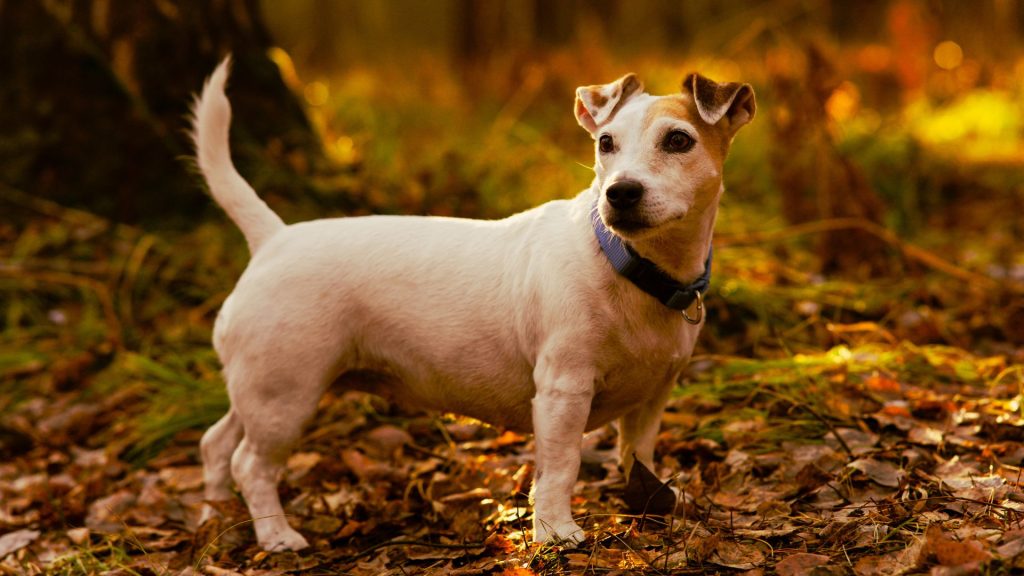
Physical Characteristics
Jack Russell Terriers are small but sturdy dogs. They typically weigh between 13 to 17 pounds and stand about 10 to 15 inches tall. Their coat can be smooth, rough, or broken, and is predominantly white with black, tan, or brown markings. They have a strong, athletic build with a compact body, making them agile and quick. Their eyes are dark and expressive, and their ears are small and V-shaped.
Temperament and Behavior
Jack Russell Terriers are known for their high energy levels and intelligence. They are bold, curious, and extremely lively. This breed thrives on activity and mental stimulation. They are also highly independent and can be stubborn, which makes consistent training essential. Jack Russells are affectionate with their families but may be wary of strangers. Their strong prey drive means they might chase smaller animals, so early socialization is crucial.
Care and Grooming Needs
The grooming needs of a Jack Russell Terrier are relatively low. Regular brushing will keep their coat healthy, regardless of the type. They are generally clean dogs and don’t require frequent baths. Given their high energy, they need plenty of exercise. Daily walks, playtime, and opportunities to run in a secure area are important to keep them happy and well-behaved. Mental stimulation, such as puzzle toys or training exercises, is also beneficial.
Health Considerations
Jack Russell Terriers are generally healthy, but they can be prone to certain conditions. Common health issues include patellar luxation, deafness, and eye disorders like lens luxation and glaucoma. Regular vet check-ups, a balanced diet, and an active lifestyle can help maintain their health. It’s also important to monitor their weight to prevent obesity, which can exacerbate health problems.
Japanese Spitz
The Japanese Spitz originated in Japan in the early 20th century. This breed was developed by crossing several small white Spitz-type dogs, including the German Spitz. The aim was to create a small, friendly, and hardy companion dog. By the 1950s, the breed was well-established in Japan and gained popularity worldwide for its charming appearance and delightful personality.
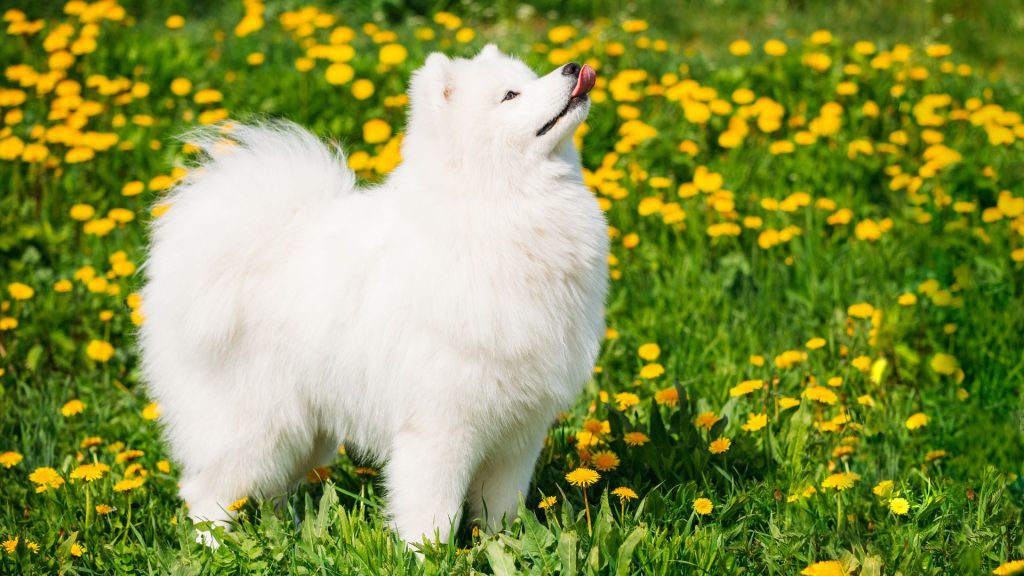
Physical Characteristics
The Japanese Spitz is a small, compact dog with a strikingly fluffy white coat. They typically weigh between 10 to 25 pounds and stand about 12 to 15 inches tall. Their double coat consists of a short, dense undercoat and a long, straight outer coat that gives them a fluffy appearance. They have a fox-like face with a pointed muzzle, dark eyes, and small, erect ears. Their plumed tail curls over their back, adding to their elegant look.
Temperament and Behavior
Japanese Spitz dogs are known for their friendly and affectionate nature. They are intelligent, alert, and eager to please, making them easy to train. This breed is highly social and enjoys being around people, often forming strong bonds with their families. They are good with children and can get along well with other pets. Despite their small size, they are excellent watchdogs, as they are naturally alert and will bark to alert their owners of any unusual activity.
Care and Grooming Needs
The Japanese Spitz’s beautiful coat requires regular grooming to keep it in top condition. Brushing their coat a few times a week will prevent mats and tangles. They are generally clean dogs and do not have a strong odor, so frequent bathing is not necessary. However, during shedding season, more frequent brushing may be needed. Regular dental care, nail trimming, and ear cleaning are also important parts of their grooming routine.
Health Considerations
Japanese Spitz dogs are generally healthy, but they can be prone to certain health issues. Common concerns include patellar luxation and dental problems. Regular vet check-ups, a balanced diet, and maintaining a healthy weight can help prevent these issues. They are also known for their longevity, often living well into their teens with proper care.
In summary, the Japanese Spitz is a delightful and elegant breed that makes a wonderful companion. With their friendly nature and relatively low grooming needs, they can fit well into various households, providing joy and companionship for many years.
Jindo
The Jindo, also known as the Korean Jindo, originated on Jindo Island in South Korea. This ancient breed has been around for centuries and is highly valued for its loyalty, intelligence, and hunting skills. The Jindo was traditionally used for hunting and guarding homes. It is considered a national treasure in South Korea, where it is protected by law.
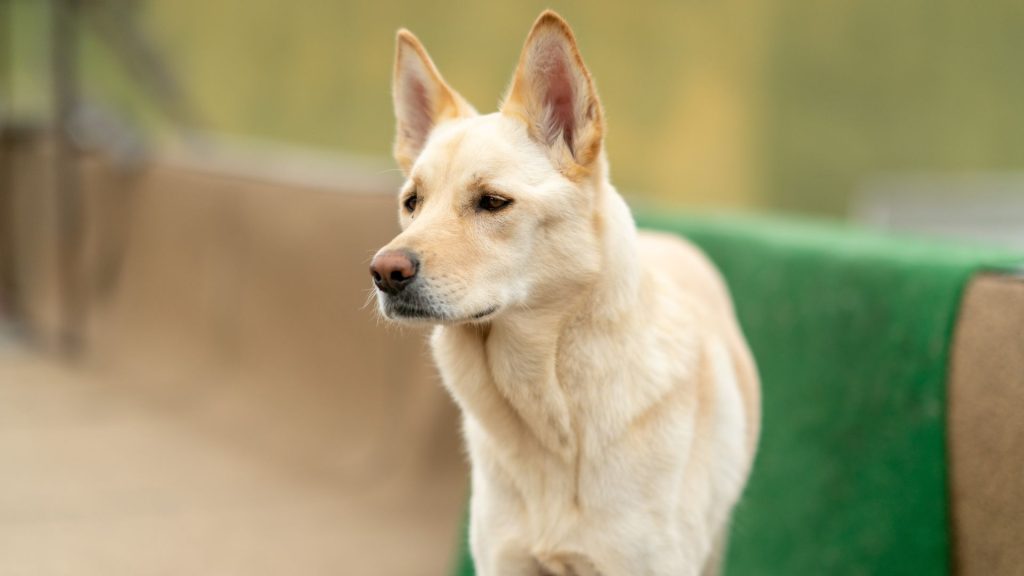
Physical Characteristics
Jindos are medium-sized dogs with a strong, well-proportioned build. They typically weigh between 30 to 50 pounds and stand about 18 to 22 inches tall. Their coat is double-layered, with a dense undercoat and a straight, harsh outer coat. Coat colors can vary, including white, fawn, red, brindle, black, and tan. Jindos have a wedge-shaped head, pointed ears, and almond-shaped eyes that give them an alert and intelligent expression. Their tail is curled and carried over their back.
Temperament and Behavior
Jindos are known for their loyalty, independence, and intelligence. They form strong bonds with their families and are often reserved around strangers. This breed is naturally protective and makes excellent watchdogs. Jindos are also known for their clean habits and are relatively easy to house train. They have a strong prey drive and may not get along well with smaller pets. Early socialization and training are essential to ensure they are well-behaved and obedient.
Care and Grooming Needs
Jindos require regular grooming to keep their coat healthy and clean. Brushing them several times a week helps remove loose hair and prevent mats. During shedding season, more frequent brushing is necessary. Jindos are generally clean dogs and do not require frequent baths. Regular dental care, nail trimming, and ear cleaning are also important to maintain their overall health. They need daily exercise, such as long walks or playtime in a secure area, to keep them physically and mentally stimulated.
Health Considerations
Jindos are generally healthy dogs, but they can be prone to certain health issues. Common concerns include hip dysplasia and hypothyroidism. Regular veterinary check-ups, a balanced diet, and maintaining a healthy weight can help prevent these issues. Jindos are known for their longevity, often living 12 to 15 years or more with proper care.
Jagdterrier (German Hunting Terrier)
The Jagdterrier, also known as the German Hunting Terrier, was developed in Germany in the 1920s. A group of hunters and dog enthusiasts aimed to create a versatile and tenacious hunting dog. By crossing various terrier breeds, including the Fox Terrier and Welsh Terrier, they produced the Jagdterrier. This breed quickly gained recognition for its exceptional hunting skills and versatility in various types of game hunting.
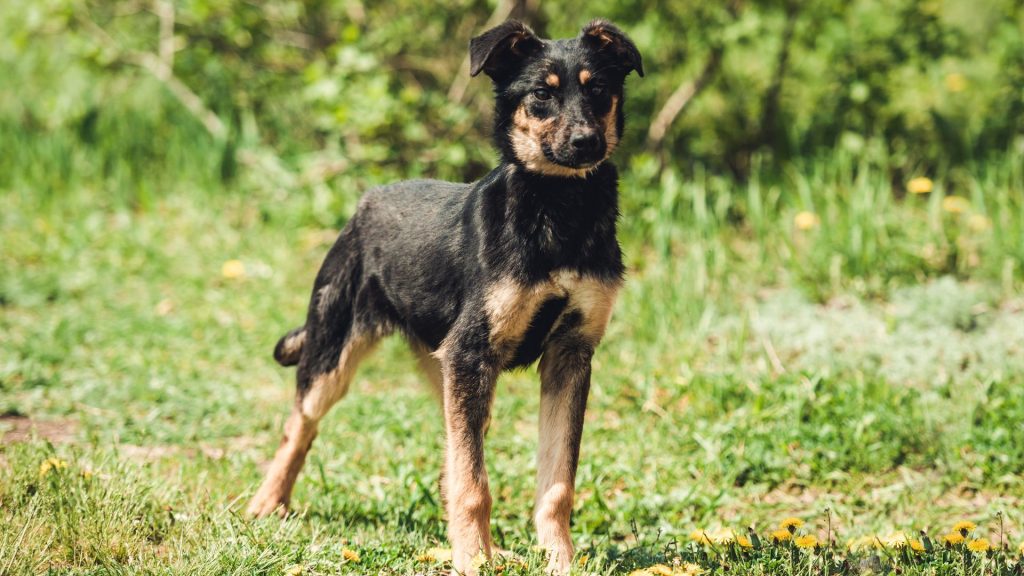
Physical Characteristics
The Jagdterrier is a small, robust dog with a strong, athletic build. They typically weigh between 17 to 22 pounds and stand about 13 to 16 inches tall. Their coat is dense, harsh, and weather-resistant, coming in black and tan or dark brown with tan markings. They have a narrow, elongated head with strong jaws, dark eyes, and high-set, V-shaped ears. Their tail is usually docked and carried high.
Temperament and Behavior
Jagdterriers are known for their high energy, intelligence, and determination. They are fearless and have a strong hunting instinct, making them excellent working dogs. This breed is highly trainable but requires an experienced handler due to its strong-willed nature. They are loyal and form close bonds with their families but can be reserved with strangers. Jagdterriers are also known for their alertness and make good watchdogs. They need plenty of mental and physical stimulation to prevent boredom and destructive behavior.
Care and Grooming Needs
The grooming needs of a Jagdterrier are relatively low. Their dense, harsh coat should be brushed weekly to remove loose hair and keep it healthy. They do not require frequent baths, as their coat naturally repels dirt. Regular nail trimming, dental care, and ear cleaning are essential parts of their grooming routine. Given their high energy levels, Jagdterriers need plenty of exercise. Daily walks, playtime, and activities like agility training or hunting exercises will keep them happy and well-behaved.
Health Considerations
Jagdterriers are generally healthy dogs, but they can be prone to certain health issues. Common concerns include hip dysplasia, eye problems, and skin allergies. Regular vet check-ups, a balanced diet, and maintaining a healthy weight can help prevent these issues. As with any breed, early detection and treatment of health problems are crucial for their well-being.
Tips for Choosing the Right Breed for You
Choosing the right dog breed begins with evaluating your lifestyle and living situation. Consider factors like your daily routine, activity level, and living space. Do you have a large yard or live in a small apartment? Are you an active person who enjoys outdoor activities, or do you prefer a more relaxed lifestyle? Matching your environment and habits with the breed’s needs ensures a harmonious relationship.
Considering the Breed’s Energy Levels and Exercise Needs
Different breeds have varying energy levels and exercise requirements. High-energy breeds like the Jack Russell Terrier need lots of physical activity and mental stimulation. They thrive in active households with plenty of opportunities for exercise. On the other hand, breeds like the Japanese Chin are more suited to a laid-back lifestyle with moderate exercise needs. Understanding a breed’s energy levels and ensuring you can meet those needs is crucial for your dog’s happiness and well-being.
Importance of Grooming and Maintenance
Grooming requirements vary significantly between breeds. Some dogs, like the Japanese Spitz, have thick coats that need regular brushing to prevent matting and tangling. Others, like the Jagdterrier, have low-maintenance coats that require minimal grooming. Consider how much time you can dedicate to grooming and maintenance. Regular grooming is essential not only for keeping your dog looking good but also for their health. It helps in early detection of skin issues, parasites, and other health problems.
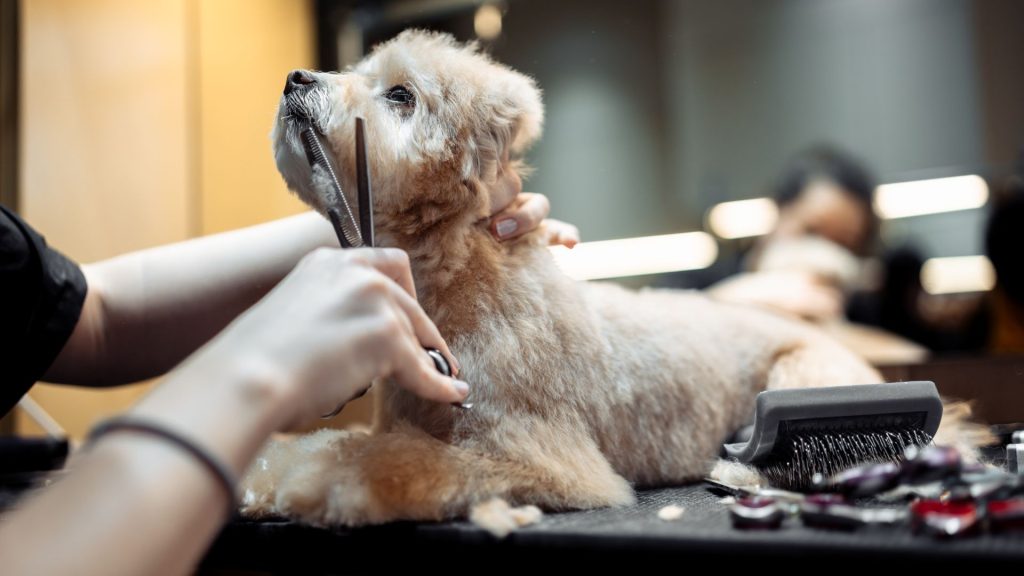
Health and Longevity Considerations
Health and longevity are important factors when choosing a breed. Research common health issues associated with the breed and consider their lifespan. For instance, breeds like the Jindo are generally healthy and can live 12 to 15 years with proper care. Regular vet check-ups, a balanced diet, and adequate exercise are vital for maintaining your dog’s health. Opting for a breed with fewer genetic health problems can lead to fewer vet visits and a longer, happier life for your pet.
In summary, selecting the right breed involves careful consideration of your lifestyle, the breed’s energy and exercise needs, grooming requirements, and health factors. By aligning these aspects, you can find a breed that fits seamlessly into your life and provides years of joy and companionship.
Adopting and Caring for Your New Dog
Adopting a dog is a rewarding experience. Start by researching reputable shelters or breed-specific rescues. Spend time with potential dogs to understand their temperament and needs. Ask about their history, health, and behavior. Ensure the dog you choose fits well with your lifestyle and environment.
Initial Setup and Preparation for Bringing a Dog Home
Before bringing your new dog home, prepare a safe and comfortable space. Get essentials like a bed, food, water bowls, toys, and grooming supplies. Dog-proof your home by removing hazards and setting up boundaries. Have a crate or designated area where your dog can feel secure.
Basic Training and Socialization Tips
Training and socialization are crucial for a well-behaved dog. Start with basic commands like sit, stay, and come. Use positive reinforcement techniques, such as treats and praise. Socialize your dog with different people, environments, and other animals to build confidence and reduce fear. Consistency and patience are key to successful training.
Importance of Regular Vet Visits and Healthcare
Regular vet visits are essential for your dog’s health. Schedule a check-up soon after adoption. Keep up with vaccinations, flea and tick prevention, and dental care. Monitor your dog’s weight and diet to prevent obesity and related health issues. Early detection and treatment of health problems can lead to a longer, healthier life for your pet.
In summary, adopting and caring for a dog involves thoughtful preparation, consistent training, and ongoing healthcare. By following these guidelines, you can ensure a smooth transition for your new dog and build a strong, loving bond.
Conclusion
In this article, we’ve explored the unique qualities of dog breeds that start with the letter J. From the elegant Japanese Chin to the energetic Jack Russell Terrier, and the loyal Jindo to the versatile Jagdterrier, each breed offers distinct characteristics and charm. We’ve discussed their history, physical traits, temperament, care needs, and health considerations. Additionally, we provided tips on choosing the right breed, adopting, and caring for your new companion.
Considering a J breed when choosing your next dog can bring a special kind of joy and companionship. These breeds, though varied, share common traits of loyalty, intelligence, and distinctive personalities. Whether you’re looking for a lively playmate, a devoted guardian, or a gentle lap dog, there’s a J breed that can perfectly match your lifestyle and preferences.
Owning a dog from one of these unique breeds can be incredibly rewarding. They offer not just companionship but also enhance your life with their individual quirks and traits. The bond you form with your dog can bring endless joy and fulfillment. By understanding their needs and providing proper care, you can ensure a happy and healthy life for your furry friend.
In conclusion, choosing a dog breed that starts with J can add a delightful and enriching dimension to your life. Embrace the opportunity to welcome one of these wonderful breeds into your home and experience the love and joy they bring.

Hello, I’m Donna Carter, the founder and writer behind PetFleck.com. My journey with dogs started years ago, and it’s been a passion that has only grown stronger over time. I’ve always been fascinated by the unique behaviors and characteristics of different dog breeds, and this curiosity has led me to dive deep into the world of canine studies.
My love for dogs is the driving force behind everything I do. I’ve dedicated countless hours to researching and understanding the nuances of dog care, training, and breed-specific traits. This dedication helps me create content that is not only informative but also genuinely helpful for fellow dog lovers and owners.
At PetFleck, I combine my extensive knowledge and hands-on experience with my passion for dogs to provide valuable insights and tips. Whether it’s exploring different breeds or offering practical advice on dog care, I aim to share knowledge that makes a real difference in the lives of dogs and their families.
I’m thrilled to share my love for dogs with you through my writing. I hope my articles inspire and inform, helping you to better understand and appreciate the incredible bond we share with our furry friends.
Thank you for visiting PetFleck.com, and I look forward to connecting with you through our shared love of dogs!

